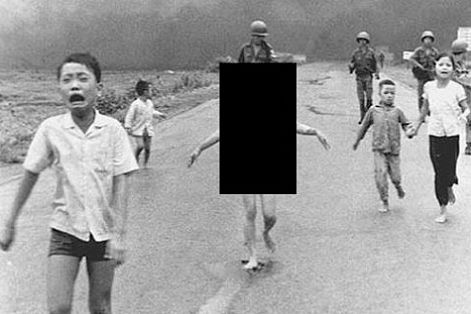Controversy over censorship by Facebook erupted last week after the social media giant removed a post featuring a famous picture from the American War.
The Guardian reports that the dispute began when Facebook deleted a post by Norwegian writer Tom Egeland, who was discussing “seven photographs that changed the history of warfare.” The post included 'The Terror of War', the Pulitzer prize-winning photograph by Nick Ut which depicts panicked children fleeing a napalm strike during the war. The iconic picture prominently features a naked 9 year-old girl, Kim Phuc. Egelend’s account was suspended by Facebook as well.
Aftenposten, Norway’s largest newspaper, reported the incident and posted the same photograph. Facebook sent the paper a message asking it to “either remove or pixelize” the picture, according to The Guardian, explaining that “any photographs of people displaying fully nude genitalia or buttocks, or fully nude female breasts, will be removed.” The social media site then deleted the article before anyone from Aftenposten could respond.
Espen Egil Hansen, the editor-in-chief and CEO of the Norwegian paper, responded by blasting Facebook CEO Mark Zuckerberg in an open letter on the publication’s front page. Hansen wrote: “I am worried that the world’s most important medium is limiting freedom instead of trying to extend it, and this occasionally happens in an authoritarian way.” He went on, saying “even though I am editor-in-chief of Norway’s largest newspaper, I have to realize that you’re restricting my room for exercising my editorial responsibility. I think you are abusing your power, and I find it hard to believe that you have thought it through thoroughly.”
The controversy escalated further when Erna Solberg, Norway’s prime minister, posted 'The Terror of War' on her Facebook profile. Three hours later, Solberg’s post was removed (she later reposted the image above with Kim Phuc covered by a black rectangle). According to The Guardian, she responded by saying “I appreciate the work of Facebook and other media to stop pictures and content showing abuse and violence. But Facebook gets it wrong when it censors pictures like these. It contributes to restricting the freedom of speech.”
On Friday, Facebook reversed course and agreed to allow the photograph on the site. Bloomberg reports that the company issued a statement saying “after hearing from our community, we looked again at how our Community Standards were applied in this case. In this case, we recognize the history and global importance of this image in documenting a particular moment in time. Because of its status as an iconic image of historical importance, the value of permitting sharing outweighs the value of protecting the community by removal, so we have decided to reinstate the image.”
The controversy highlighted the challenges Facebook must confront in moderating content posted by its 1.7 billion monthly users.
[Photo via Erna Solberg's Facebook page]














